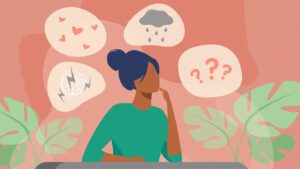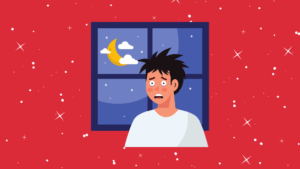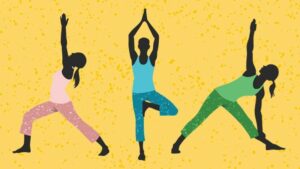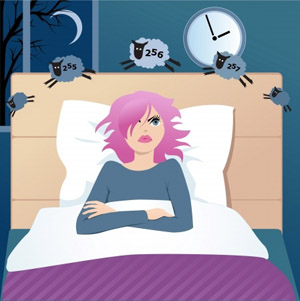Do you have trouble sleeping? Do you find yourself tossing and turning all night, unable to get the rest you need? If so, you’re not alone. Millions of people suffer from insomnia every year. But what if your sleeplessness is due to bipolar disorder? If that’s the case, it can be a little more difficult to get the sleep you need. In this blog post, we will discuss the link between bipolar and insomnia, and tips to manage these conditions.
Contents
What Are Bipolar And Insomnia?
 Bipolar disorder is a mental illness that causes extreme changes in mood. People with bipolar disorder can have periods of feeling very happy and energized, followed by periods of feeling very sad and hopeless. Insomnia is a sleep disorder that makes it difficult to fall asleep or stay asleep.
Bipolar disorder is a mental illness that causes extreme changes in mood. People with bipolar disorder can have periods of feeling very happy and energized, followed by periods of feeling very sad and hopeless. Insomnia is a sleep disorder that makes it difficult to fall asleep or stay asleep.
Bipolar disorder and insomnia often go hand-in-hand. In fact, research has shown that people with bipolar disorder are four times more likely to also have insomnia.
It is also believed that insomnia can actually trigger manic episodes in people with bipolar disorder. This is because sleep deprivation can cause changes in brain chemistry that can lead to mania. More often, bipolar and insomnia co-occur because people with bipolar disorder often have difficulty regulating their sleep patterns.
If you suffer from both bipolar disorder and insomnia, it is important to get the help of mental health professional. With proper treatment, you can manage both conditions and get the sleep you need.
What Are The Common Symptoms Of Bipolar And Insomnia?
There are a few common symptoms that are associated with both bipolar and insomnia. These include:
- Difficulty falling asleep
- Waking up frequently during the night
- Feeling exhausted during the day
- Having trouble concentrating
- Feeling irritable and fatigue
- Having mood swings
It is also believed that there is a link between bipolar and sleep apnea. This is a condition where someone stops breathing for short periods of time during the night. Also, it can be difficult for people with bipolar to stay on a regular sleep schedule. This can be due to the fact that their mood swings can cause them to have irregular sleep patterns.
According to studies, it is estimated that 60-80% of people with bipolar disorder also have some form of insomnia. This is a higher rate than the general population, which is only about 30%. So, if you are struggling with both bipolar and insomnia, you are not alone. There are many people who are dealing with the same thing.
The good news is that there are treatments available that can help you get the sleep you need. If you are struggling with bipolar and insomnia, talk to your doctor about treatment options. There are many different ways to treat both conditions, so there is sure to be a treatment that will work for you.
How Does Bipolar Affect Sleep?
 Bipolar disorder is a mental health condition that affects a person’s mood, energy levels, and ability to function. People with bipolar disorder often experience extreme highs and lows in their mood, which can make it difficult to get a good night’s sleep.
Bipolar disorder is a mental health condition that affects a person’s mood, energy levels, and ability to function. People with bipolar disorder often experience extreme highs and lows in their mood, which can make it difficult to get a good night’s sleep.
If a person is suffering from bipolar then there are several reasons that their sleep might be affected. The most common are:
- Mania or hypomania (an elevated mood) can cause a person to feel restless and have difficulty sleeping.
- Depression (a low mood) can make a person feel tired and exhausted, making it hard to fall asleep or stay asleep.
- Anxiety or stress can make it hard to fall asleep or stay asleep.
- Medications for bipolar disorder can sometimes cause insomnia as a side effect.
- Co-occurring conditions, such as ADHD, can also make it difficult to sleep.
So during the bipolar disorder treatment process, it’s important to talk to your doctor about any sleep problems you’re having. They can help you identify the cause of your insomnia and come up with a treatment plan to help you get the rest you need.
Moreover, bipolar and insomnia can be a vicious cycle. Poor sleep can worsen bipolar symptoms, and the stress of dealing with bipolar can make it even harder to sleep. So it’s important to find ways to break the cycle and get the rest you need.
What Are The Consequences Of Bipolar And Insomnia?
 There is believed to have a strong connection between bipolar disorder and insomnia. It is estimated that nearly 80% of people with bipolar disorder experience some form of sleep disturbance. This can include difficulty falling asleep, staying asleep, or early morning awakening.
There is believed to have a strong connection between bipolar disorder and insomnia. It is estimated that nearly 80% of people with bipolar disorder experience some form of sleep disturbance. This can include difficulty falling asleep, staying asleep, or early morning awakening.
There are a number of consequences associated with this lack of sleep. People with bipolar and insomnia are more likely to have several negative impacts, some of these include:
Daytime fatigue
When you don’t get enough sleep at night, you are more likely to feel tired and sluggish during the day. This can make it difficult to concentrate, stay on task, and be productive. In fact, fatigue is one of the most common complaints among people with bipolar and insomnia. For example, one study found that nearly 60% of participants with bipolar disorder and insomnia reported excessive daytime sleepiness.
Mood swings
Not getting enough sleep can also lead to mood swings. You may find yourself feeling more irritable than usual, or you may have sudden outbursts of anger. This can be a problem both at home and at work. In fact, mood swings cause problems with relationships because it’s hard to communicate effectively when you’re feeling so unstable. For example, you may say something you don’t mean to your partner or children, and this can lead to arguments.
Impaired memory
Sleep is vital for consolidating memories and forming new ones. When you don’t get enough sleep, your ability to remember things suffers. This can be a particular problem for people with bipolar disorder, who may already have difficulty with memory and concentration. In fact, lack of sleep can also make it harder to focus and pay attention. This can make it difficult to stick to treatment regimens, which can, in turn, impact the stability of your condition.
Poor decision-making
Sleep deprivation can lead to poorer judgment and decision-making. This is because sleep plays a role in Executive Function, which includes things like planning, prioritizing, paying attention, and controlling impulses. People with bipolar disorder may be especially vulnerable to this because the illness itself can impair executive function. Poor decision-making can then lead to more serious problems, like relationship difficulties, job loss, and financial problems.
Heightened anxiety
Bipolar and insomnia can also impact your anxiety. It can be hard to wind down at night when you’re anxious. Your mind may race with all the things you have to do or worry about. This can make it hard to fall asleep and stay asleep. And your heightened anxiety can also lead to more nightmares and night terrors. More often than not, people with bipolar disorder also have anxiety disorders.
These consequences can have a significant impact on every aspect of a person’s life. For example, if you have problems at sleeping, your bipolar disorder may get worse. And all the negative impacts due to lack of sleep can make it hard to function at work, school, or home. So it’s important to get the sleep you need.
How To Deal With Bipolar And Insomnia?
 When the conditions of bipolar and insomnia mix, it can be a dangerous combination. People who suffer from bipolar disorder are at a higher risk of developing insomnia, and vice versa. Here are some tips on how to deal with both conditions:
When the conditions of bipolar and insomnia mix, it can be a dangerous combination. People who suffer from bipolar disorder are at a higher risk of developing insomnia, and vice versa. Here are some tips on how to deal with both conditions:
Understand the difference between bipolar and insomnia
This is the first thing you can do. People with bipolar disorder experience two different types of insomnia. The first is called “intrinsic” and the second is “extrinsic.” Intrinsic means that the person’s sleep patterns are disturbed because of their mental state. Extrinsic means that outside factors, such as work or stress, are causing insomnia.
Create a sleep schedule
One of the best ways to combat both bipolar and insomnia is to create a sleep schedule. This means going to bed and waking up at the same time every day, even on weekends. Creating this type of routine will help your body adjust and make it easier to fall asleep at night. It is an essential part of bipolar and insomnia treatment. Also, you should avoid napping during the day so that you can stay asleep at night.
Avoid caffeine and alcohol
This is often important for overall good sleep habits but can be especially helpful if you have bipolar disorder. Caffeine can cause mania, while alcohol can cause depression. Both of these can worsen your symptoms and make it harder to get a good night’s sleep. Also, this is not the time to start using any new medications or supplements, as they can also have an effect on your sleep. If you are having trouble sleeping, talk to your doctor about what might be causing it and whether there are any safe treatments that can help.
Practice relaxation techniques
Relaxation techniques are a key part of managing bipolar disorder and can help you get the sleep you need. There are many different techniques you can try, including:
- progressive muscle relaxation
- deep breathing exercises
- visualization or guided imagery
- mindfulness meditation
Try a few different techniques to see what works best for you. You may also want to consider talking to a therapist who can help you learn how to manage your bipolar disorder and get the sleep you need.
Try acupuncture
Acupuncture is a great way to ease anxiety and promote sleep. It can be done in a group or individually, and there are many reputable practitioners out there. If you’re interested in acupuncture, make sure to do your research and find a qualified practitioner near you. It works by stimulating specific points in the body, which can help to release tension and promote relaxation.
In fact, researchers have found that acupuncture can be an effective treatment for insomnia. One study found that acupuncture was able to improve sleep quality in people with bipolar disorder.
Practice yoga
 Yoga is often recommended as a way to ease stress and promote relaxation. There are many different styles of yoga, so it is important to find one that is right for you. Some common yoga for bipolar and insomnia can include:
Yoga is often recommended as a way to ease stress and promote relaxation. There are many different styles of yoga, so it is important to find one that is right for you. Some common yoga for bipolar and insomnia can include:
- supported shoulder stand
- corpse pose
- legs up the wall pose
Practicing yoga can help ease symptoms of bipolar and insomnia by promoting relaxation and helping to reduce stress. It is important to find a style of yoga that is right for you and to practice regularly for the best results. If you are unsure about how to get started, consider talking to a yoga instructor or your healthcare provider.
Talk to a therapist
A therapist can help you develop coping mechanisms for when you’re feeling anxious or depressed. They can also help you identify any triggers that may be causing your insomnia. If your insomnia is caused by a medication you’re taking, a therapist can work with you to find an alternative treatment. There are several types of therapy options available, so you can find one that works best for you.
Cognitive-behavioral therapy (CBT) is a type of therapy that has been shown to be effective in treating insomnia. CBT can help you change the way you think about sleep and develop healthy sleep habits. If your insomnia is caused by anxiety or depression, CBT can also help you manage those conditions.
Be patient with yourself
This is an essential key in managing any chronic illness, but it’s especially important when you’re dealing with bipolar disorder and insomnia. It can take time to find the right combination of treatment options that work for you, and there will likely be ups and downs along the way. Don’t get discouraged if things don’t improve immediately – keep working at it and eventually you’ll find the sleep solutions that work best for you.
There are a few different ways to approach bipolar insomnia. If one method doesn’t seem to be helping, don’t give up – there are other options out there. You can talk to your doctor about trying a different medication or explore other treatment options like therapy or relaxation techniques. Therefore, find the treatment that works for you and stick with it.
Conclusion
To conclude, bipolar and insomnia are both serious conditions that can have a profound impact on your life. If you are suffering from bipolar disorder and insomnia, it is important to seek professional help. There are treatments available that can help you get the sleep you need and manage your bipolar symptoms. With treatment, you can live a full and productive life.
If you found this information helpful, please share it with others who might benefit from it. And, as always, if you have any questions or would like to learn more about bipolar and insomnia, please contact Mantra Care for expert guidance.
For more information, please contact MantraCare. Bipolar disorder is a mental illness characterized by extreme shifts in mood, energy, and activity levels. If you have any queries regarding Online Bipolar Disorder Counseling experienced therapists at MantraCare can help: Book a trial Bipolar Disorder therapy session


